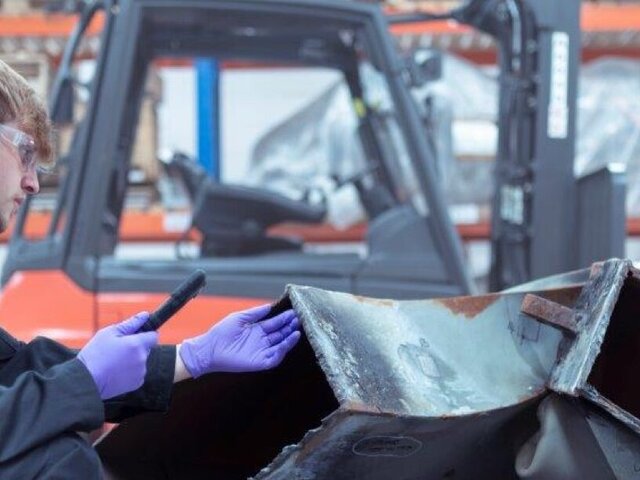Differential Scanning Calorimetry (DSC) Services
If you need to identify the physical and thermal properties of a range of materials including polymers, metals and amorphous materials, then The Lab’s industry-leading DSC service can help. Contact us today. DSC can analyse a range of materials and uses variations in temperature against time to monitor changes in physical properties of the sample.
Our DSC analysis service has a broad range of applications and can be used for:
- Failure analysis
- Quality control
- Research and development
- New product development
Operated by our experienced and qualified scientists, our DSC equipment is ideal for the testing of plastics, paints and lacquers, rubber (elastomers), oils and fats, polymers, metallic substances, alloys and composites.
What is Differential Scanning Calorimetry (DSC)?
First developed in the early 1960s, Differential Scanning Calorimetry (DSC) is a thermoanalytical technique which measures the flow of heat into or out of a sample as a function of temperature or time. This occurs as the sample is exposed to a controlled temperature programme.
As it is a thermoanalytical technique, it is concerned with how the properties of a sample change with temperature.
In short, DSC can be defined as - heat flow changes vs temperature or time.
By measuring the amount of heat released or absorbed by a sample during heating or cooling over a range of temperatures, it’s possible to determine at what point phase changes occur in a material, e.g. glass transition temperature, fusion, and crystallisation events etc.
As mentioned earlier, this makes DSC an ideal analytical technique for new product development, research and development, failure analysis and more.
What is Differential Scanning Calorimetry (DSC) used for?
Because DSC is able to determine thermal properties of a material and the point at which phase changes occur, it has found widespread use across a broad range of manufacturing, processing, and refining industries.
The table below lists the industries in which DSC is commonly used, and what it is used to detect:
Industry | DSC Application |
Plastics (thermosets, coatings, adhesives, thermoplastics, packaging). | Melting, glass transition, curing reactions, crosslinking, cold crystallisation, oxygen induction time, kinetics. |
Paints and lacquers. | Curing reactions, glass transition. |
Rubber (elastomers). | Vulcanisation, glass transition, melting, filler influence. |
Oils and fats. | Wax appearance/disappearance, melting behaviour, crystallisation, oxidative and thermal stability (oxidation induction time). |
Automotive. | Melting, curing, glass transition, crystallisation, decomposition. |
Pharmaceuticals. | Polymorphism, melting point, crystallisation, glass transition, purity, kinetics. |
Chemical. | Glass transition, crystallisation, melting, specific heat capacity, polymorphism, purity, oxidation, safety studies. |
Energy. | Melting, curing, glass transition, crystallisation, decomposition, eutectoid point, eutectic point, phase transition, Curie temperature. |
Academia. | Influences on glass transition, melting, crystallisation, polymorphism, specific heat capacity, reaction kinetics, Curie temperature. |
Food industry. | Melting, glass transition, crystallisation, polymorphism, denaturation, dehydration, liquid fraction. |
The Lab’s Differential Scanning Calorimetry (DSC) experience
Here at The Lab, we’ve supported businesses large and small with their DSC analysis requirements.
To take just a few examples, The Lab has worked with businesses in the maritime industry to analyse the thermal and oxidative stability of oils for quality control and failure purposes where stabilisers are used. We have used it to find Wax Appearance Temperature (WAT) to evaluate the possible wax precipitation of a fuel.
We’ve also worked with FMCG companies to analyse the shelf life and stability of products via kinetics.
The Lab has extensive experience using DSC for paint and coatings analysis for fabricators, manufacturers, and others. DSC was used to identify important characteristics of paints and coatings such as identifying incomplete curing/quality of cure, the characterisation of melting and softening behaviour, and thermal and oxidative stability.
Those are just a handful of examples of how The Lab’s DSC service has helped businesses with their product development, quality control and failure analysis needs.
Contact The Lab today and find out how our DSC service can help your business.
